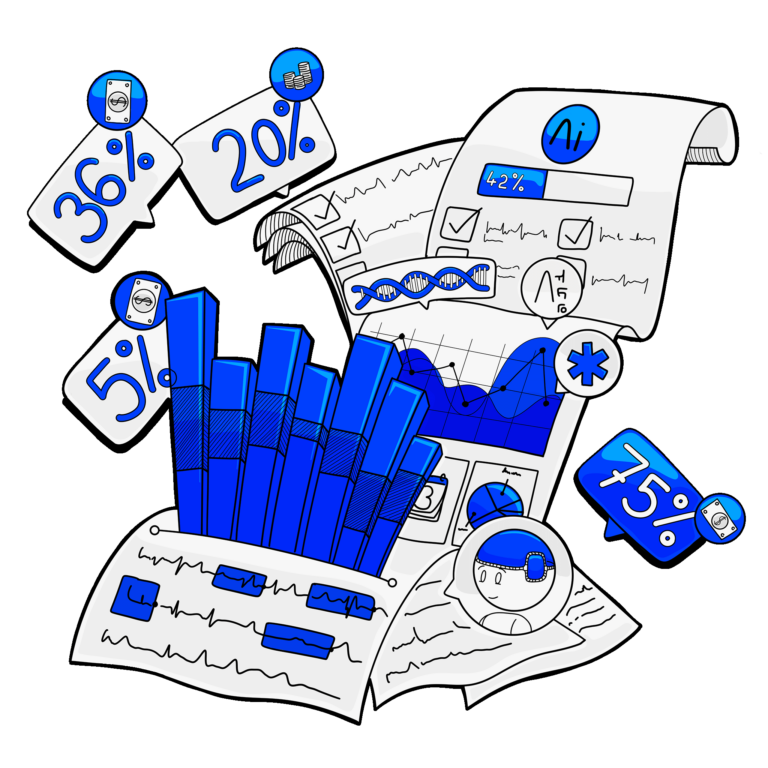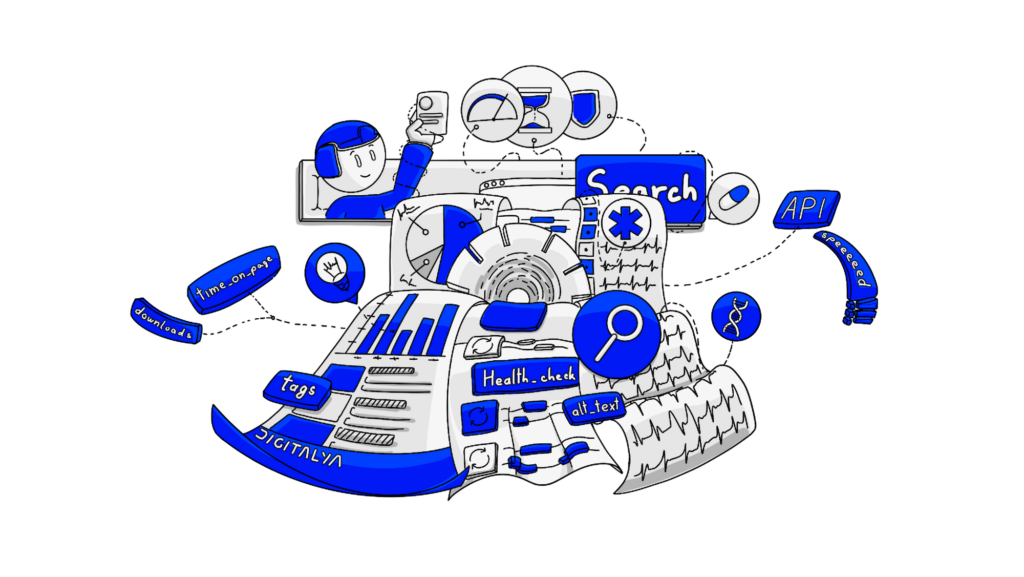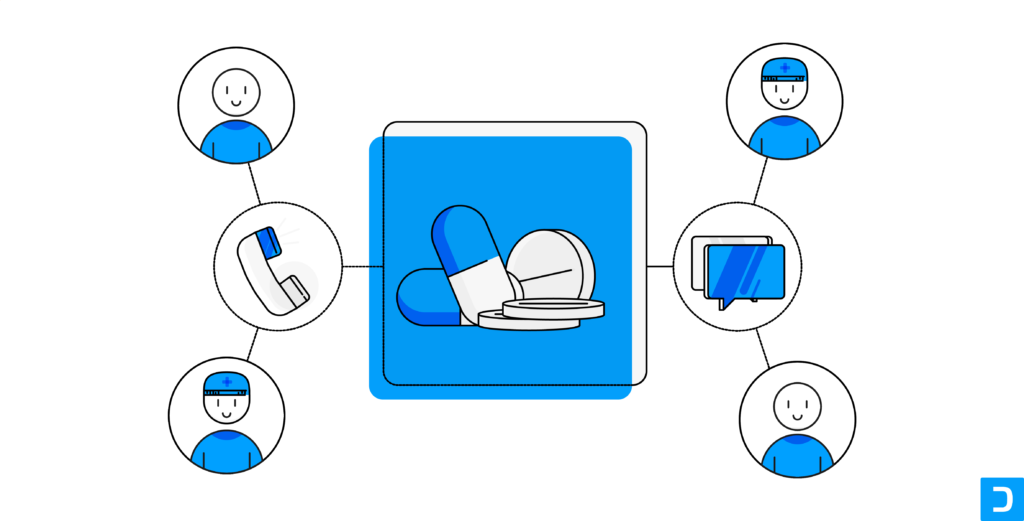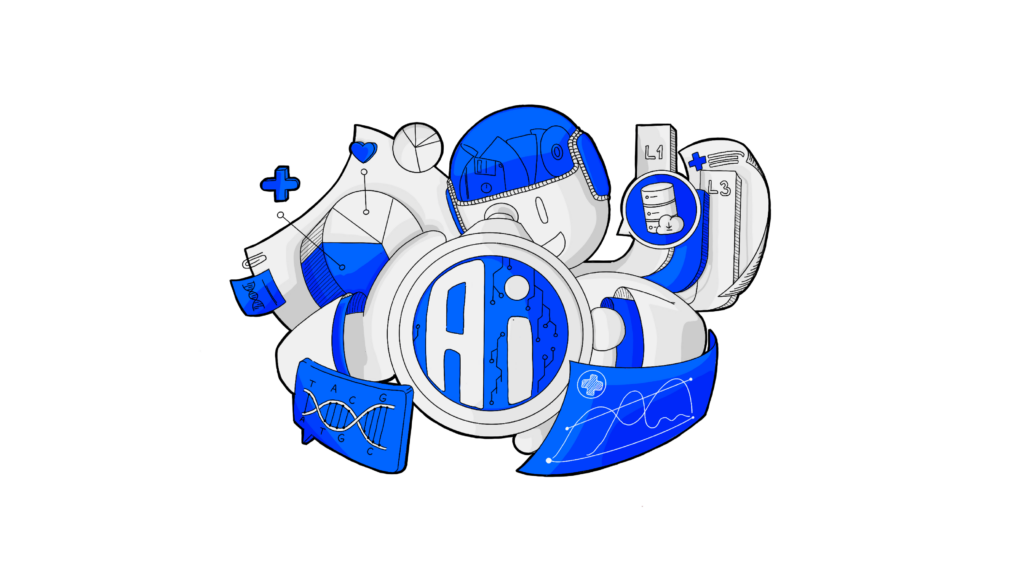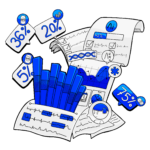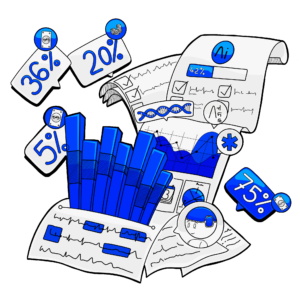Recently, the healthcare industry faced unprecedented challenges and had to adapt. Healthcare apps development was one of the answers. It provided innovative solutions that streamlined some health care business processes during challenging times.
Let’s take a look at the healthcare apps that are available today. What do you need to consider if you plan on building medical apps yourself?
1. What is the purpose of digital health?
Digital healthcare is the application of digital transformation to the healthcare industry. This includes healthcare apps, electronic health records or EHRs, electronic medical records or EMRs, wearable gadgets, telehealth, and so much more.
Generally, digital health makes care delivery more focused on patients and prevention. This is posible with the help of artificial intelligence, machine learning, big data, and many more.
Additionally, digital healthcare facilitates advancements in patient care with technologies like ingestible sensors, robotic caregivers, and other gadgets or healthcare apps for patient monitoring. Digital health technologies are a significant help in the efforts to reduce inefficiencies, reduce costs, increase service quality, and even empower patients to make more informed decisions regarding their health.
2. What is healthcare transformation?
Even before the pandemic, the global healthcare system was beginning to change. Continuous pressure added from chronic diseases, limitations in resources, and other social circumstances, paired with technological advances and changes in the customers’ behavior, are some of the factors that contribute to the transformation of the traditional models of care delivery.
Leaders in the healthcare industry should shift their focus to their patients. This is done through a care model based on prevention, for example. Also, they should continuously improve their services and adopt digital and technology enablers.
For any business going through a corporate transformation, four basic building blocks apply to any enterprise, including the ones in the healthcare industry.
a. Build around a strategic identity
Nowadays, consumers solve their problems with a few clicks and in a matter of seconds. This also applies to patients. Therefore, keeping in mind customer expectations is always a good idea – the patients and their requirements should be the focus.
When you’re working on your new strategic identity, you will need active support from all the stakeholders in the industry – from nurses to clinicians, executives, and patients. The whole purpose of transformation is to become consumer-centric, set your goals incrementally, and work your way toward them. However, never forget to keep consistent in the messages you’re sending to the public.
b. Work on trust
The healthcare industry is one of the many entities losing public trust. Using technology could be the answer to offering more personalized care and targeted treatments. However, managing patient data during data breaches can be a significant setback for digitalization.
Another critical step in building trust with your customers is being fully transparent. Sharing complete information about the services and treatments your offer, along with the prices, is a step forward.
Additionally, keeping patients engaged and improving communication with them is another crucial factor. Providing customers with patient portals or a place where one can access their medical records at all times, facilitate appointment scheduling, or even communicate directly with healthcare professionals.
c. Test your improvements before scaling them
Even though tech culture embraces fast failure, the healthcare culture puts patients’ safety first. Therefore a balance between access and security is crucial, along with satisfying the needs of healthcare professionals and patients.
One way to minimize risks is by using technology platforms and advanced data analysis. For instance, using a digital model of the human body to see the outcomes of your trials can accelerate the pace of your research without exposing you to the risks associated with it.
Additionally, digital tools can increase the number of participants in clinical trials – some companies already use social media to find eligible participants. Once enrolled, a mobile app can be used to communicate with them at all times and improve information transfer and data collection.
d. Build on your legacy
If you want your transformation to be successful, you need to reach a balance between your existing strengths and your new strategies. It’s always a good idea to build on and improve what you already do best so you don’t stray far from your core identity.
When looking for external partners for your new strategies, always make sure that they share your vision and your set of values. Ensure that the innovation you seek adds value to your services and business.
Having said all that, here are some crucial points that should be part of your checklist for a transformative digital architecture in healthcare:
1. API-first
APIs shouldn’t be treated as middleware but as a software product that will empower developers and accelerate innovation – this is a different strategy compared to integration-first operations, where APIs were usually created and then forgotten about.
With a decoupled system, digital services can be modularly assembled from digital sources across various sources. This allows interoperability in healthcare apps to occur.
2. Interoperability stack
This starts with APIs and FHIR compliance. Harmonizing structured and unstructured data into standard formats is a significant step beyond creating APIs. Also, having APIs allows you to connect data to analytics or artificial intelligence tools while having robust interoperability makes these connections reliable and scalable.
3. Patient data security
With interoperability comes the need to protect medical data while sharing it with healthcare professionals and institutions. Healthcare app developers should be to analyze data while observing the Zero Trust principles and being HIPAA compliant.
4. Minimize latency
When dealing with urgent care, access to real-time data is crucial. The moment information is recorded into the system, it should be converted into a consumable format so that it can be combined with other sources, analyzed with machine learning tools, or whatever else is needed. Updates should reach patients in minutes or hours, in the worst case.
5. Scalable development
The scale and scope of medical data can rapidly increase. Therefore any system developed should be easily scalable to accommodate any new requirements.
3. Why is digitalization important in healthcare?
Short answer: it empowers the patients.
Long answer: let’s examine some specific benefits.
Improving patient-doctor coordination
Digitization provides a better way for a care professional to access a patient’s medical information at all times without needing physical copies of their files. This will also allow patients to share their medical information with other healthcare professionals or use it in an emergency.
Automate repetitive tasks
In the United States, expenses for administrative tasks account for more than 25% of the total expenses in a hospital. Additionally, medical professionals spend less than 30% of their time providing patient care. The current system is inefficient since hospital funds and physicians’ time are valuable.
Task automation, respectively, digitization can reduce the burden on healthcare professionals, allowing them to focus on delivering care to patients instead. Advanced artificial intelligence systems can provide prescription advice, appointment reminders, or medication reminder.
Make communication better between medical professionals
Some cases of disease management require multiple specialists to communicate permanently to create the best medical plan for a patient. Having a digital system in place prevents situations in which conflicting medications are prescribed. Additionally, when information is constantly shared, physicians are always aware of the progress.
Increased data security
When relying on physical files for your medical records, you’re at risk of permanently losing them due to unexpected situations like natural disasters or human negligence. While it’s true that digital data storage systems are somehow vulnerable, there can be precautions taken to minimize the potential risks.
Real-time medical data
Nowadays, many gadgets and wearables are capable of monitoring heart rate, counting steps, or even taking an EGG. This is very useful for both app users and doctors. These wearable healthcare apps transmit medical data online, and physicians can, for example, set alarms for when certain conditions are met – so that medical care is delivered fast. This could be a great way to remotely monitor overall health and a significant step towards preventive care.
4. What are the benefits of health apps?
More and more healthcare organizations are turning to software development to extend the boundaries of their services. Healthcare apps are becoming the preferred way for patients to access their healthcare providers, track their steps and heart rate, and even launch video consultations.
Patients have easier access to providers and medical care
Healthcare apps for patients enable them to reach their physicians easier, even through text messages or even a scheduled virtual doctor consultation. There are a lot of conveniences provided by these digital services, including m-healthcare apps, that some health systems provide online doctors after hours or on weekends.
Boost medication adherence
Healthcare apps are a great way of monitoring the way patients take their medication after they leave the hospital. Poor medical adherence is an important cause of poor chronic disease management and can lead to hospital readmissions and even unfortunate outcomes.
Online medication apps are a great way of managing prescriptions and even sending medication reminders to app users.
Improve patient management
A health app makes remote patient management possible by collecting medical information and transferring it directly to healthcare professionals. Being able to easily access data about a person’s health between a doctor’s visit and another is a big step forward in improving care delivery. This is mainly possible through mobile devices and apps, especially wearable devices.
Reduce the hassle of payments
Healthcare apps can streamline dealing with medical bills – by integrating a highly secured payment gateway, you can save a lot of time since payments are made instantly. Additionally, some apps provide users with the possibility to connect with their health insurance providers.
5. Do people use healthcare apps?
Even though mobile medical apps don’t sound like news anymore, the number of people that use health and wellness apps is still growing. How many healthcare apps are there? Since 2015 the number of healthcare apps available on the apps market has doubled, with more than 350 000 m-healthcare apps available in 2021.
90% of healthcare professionals already use health apps at work for accessing electronic health records, communicating with their colleagues, and medical references, or simply managing their schedules.
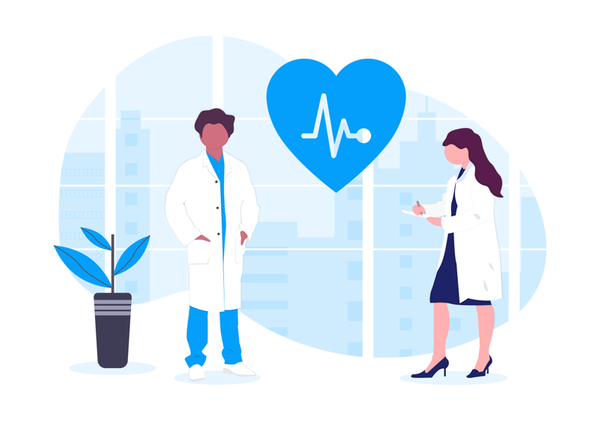
6. Which are the best healthcare apps in 2024?
Now that we’ve been through all the benefits of digital transformation and digitization in the healthcare industry, let’s see which are the best healthcare app ideas in 2024.
1. Reminder apps
A medical reminder app is very useful for people with fast-paced lifestyles. Their key features should be appointment reminders, medication reminders, or anything they need to do between doctor visits.
This app idea has a lot of usage for chronic diseases management and even recovery.
2. Doctor consultation apps
The purpose of these apps is to allow users to have easy access to healthcare assistance when physical doctor visits aren’t possible. For this type of situation, patients need to be able to schedule video consultations or at least communicate with their physicians via text messages.
These kinds of apps could also be rural healthcare apps, providing care to patients that live in areas where they don’t have access to physicians or house calls.
3. Medical records apps
These fall into the apps for patients category, as well as apps for doctors. They’re a good way of increasing efficiency, as they bring together all the critical patient data in a single place. Having your healthcare data in an application instead of a pile of physical files allows patients to access their lab results, medical information, or any data at any time and, more importantly, when going to multiple physicians.
4. Women healthcare apps
This type of home health care apps is specifically designed for women’s health needs. Primarily used for health tracking and monitoring, they offer great insights and statistics about menstrual cycles, pregnancy, or other medical issues.
There are also mental health apps that offer therapy or counseling tailored for women.
5. Medical training apps
These healthcare apps for doctors in training and nurses are a great way of sharpening and improving skills. They can become a platform for medical education, especially for new medical technologies. With the help of virtual reality, augmented reality, or mixed reality, these apps could be even used for remote interventions or even replace the need for doctors’ presence in physical therapy.
Another category of healthcare education apps is designed to break the language barrier between doctors and patients. This medical translation can come in handy for explaining diagnostics, symptoms, or treatments for non-native speakers and even breaking disability barriers, allowing all people to understand better the information provided by healthcare providers.
6. Apps for managing chronic diseases
Chronic healthcare apps provide much-needed assistance and management for this kind of patient. Some key features would be the ability to track blood pressure, glucose levels, weight, or other health issues daily. IoT can be integrated into these apps, making there more efficient and ready for remote monitoring and counseling.
7. Pharmacy delivery apps
Especially in the case of infectious diseases, the possibility of delivering treatment plans directly to the patient is life-changing. Additionally, you can pair this with a price comparison app. There are a lot of similar treatments available for very different prices, so this could be an excellent way of keeping you informed about your options.
8. Mental health apps
More and more people suffer from stress, anxiety, depression, or just lifestyles that lead to burnout in the long run. This affects mental and physical health; even after diagnosis, some patients find it hard to manage their conditions.
Mental health apps can bring some relief and be a great way to track symptoms and moods. Even though it isn’t a therapy app, it’s a great way of monitoring or even improving behavioral health in between therapy sessions.
9. Apps to improve safety and compliance
Studies show that more than 250 000 people in the United States die because of avoidable hospital errors. Providing online web-based training for your healthcare staff can improve patient safety outcomes.
You can incorporate the assessment tool for hospitals provided by OSHA for determining enterprise safety and health management system performances. Also, you can develop your safety compliance plan and create a rapid response system (or use the one developed by AHRQ).
10. Apps for Data capture and analysis
We’re now entering the world of Big Data – this technology allows you to manage, analyze, and leverage data. Using healthcare analytics can reduce treatment costs, predict outbreaks or epidemics, and even improve the quality of life in the long run.
7. Examples of healthcare apps
While we discussed some healthcare app ideas, to innovate, you need to be aware of what is already available on the apps market and find ways to improve on existing solutions.
1. Doctor on demands
This is a medically certified mobile app for patients to have their questions answered and even schedule video consultations with a doctor and have treatment plans written for them. Even though this isn’t suitable for urgent care, this app is a great way to talk to a doctor via video calling and find relief for your flu or sports injury.
2. HelloMD
While it doesn’t provide you with actual medical care, this app is an excellent way of finding various specialists for specific and rare health conditions. The app lets you schedule appointments with a physician, which will take place online. The purpose of HelloMD is to connect patients with doctors so they can continue treatment off the platform.
3. Microsoft Health Vault
Just like the name suggests, this app allows users to store their medical records safely and keep them updated. This information can only be shared with healthcare professionals or trusted people. This can also be a tracker app for sugar levels, blood pressure, or oxygen saturation. You can put in data manually or collect it through any medical device or other apps you use.
4. Epocrates
This is a top healthcare app for pharmacists. It is a comprehensive archive of medical information, a drug interaction checker, and a pill identification tool. It also has a texting service that is HIPAA compliant, where physicians and other healthcare professionals can communicate.
5. Better health
Better health gives its users access to mental health professionals and online counselors. With the help of text messages and video calls, patients can benefit from online therapy sessions with over 300 trained and accredited counselors that cover various areas, from depression to couples therapy. There are also group webinars and community features to offer more support for patients using this app.
6. EyeCare Live
As the name suggests, this app connects you with a doctor and asks you to record your condition through various pictures and videos of affected eyes. This isn’t appropriate for severe conditions, but for things like dry eyes, allergies, or contact lenses-related questions, this app can be a great help.
8. What does a health app need?
To answer this question, first, we need to consider what patients want in healthcare apps. That is because even if the purpose of medical apps is to improve care delivery for patients, most of them fail to match users’ expectations.
According to some studies, most healthcare apps have less than 10 000 downloads – which is an extremely low number compared to the number of apps available. There is an endless growth opportunity in this domain, and the healthcare app development market is expected to reach $102.43 billion by the end of 2022. This only means that in order to succeed, you need to identify the pain points and try to provide solutions for healthcare apps users.
1. Ease of use
As with any software, the harder it is to use, the faster it will lose users. Sure, it’s a good selling point to have unique functionalities in your app, but you still have to make sure that the basic ones work smoothly.
The primary purpose of an app should be to save time on managing appointments or facilitating video consultations and to provide the ability to easily access medical records and valuable information – either in case of an emergency or to share with healthcare professionals.
2. Clear information and actionable steps
A secondary purpose of a health app should also be medical education. Most people download this type of app to learn more about their conditions and take action according to the information available.
3. Improve communication with healthcare professionals
Apps should facilitate the patient-doctor relationship. Studies show that almost 3 quarters of ER and urgent care visits could have been handled online. Therefore, a medical app should be able to provide the means for performing video consultations that would have near – or better- experiences than conventional doctor consultations.
4. Sense of community
When people use health and wellness apps, social features can help them commit to their treatment plans or new habits more efficiently. An online community provides users with a space for interaction and experience sharing. Additionally, for people that have received an unfavorable medical diagnosis, engaging with other people can be a much-needed boost of morale.
5. Take into account user experience
Data shows that almost 90% of healthcare apps are not used regularly after being downloaded. This mostly happens because of poor user experience and a bad first impression. Thus, it’s essential to have a user-friendly UI to retain and engage patients.
6. Wearable devices integration
Nowadays, most people use some health tracker or smartwatch.
So what key features should healthcare apps have? Well, it depends on their purpose. Let’s divide them into categories:
Healthcare apps for patients
- Registration and login – let users input their information with in-app registration so that you can reduce wait times for the appointments. You can allow users to create a profile and complete it with any information they need – but make sure their data is secure and that your app is HIPAA compliant.
- Doctor profiles – patients should be able to choose their doctor according to their preferences. They should be able to look up their credentials, reviews left by other patients, or even their location.
- Appointment scheduling – this is one of the essential features that your users will expect. You can display what slots are available for appointments and allow users to book one that is convenient for them. Also, a confirmation message should be sent for a great user experience.
- Reminders and notifications – this is a crucial feature to include in your app. However, be careful with push notifications because, if you go overboard with them, they can affect the user experience.
- Video calling – if you plan to make video consultations available, you need to provide audio and video features for your users that are secure and encrypted.
- In-app chats – you can include chatbots that rely on artificial intelligence to interact with your users. Those can be used to check symptoms, and, using AI and ML algorithms, they can determine and suggest the next course of action and book an appointment.
- Medical devices integration – medical devices can collect health information about the patient that can be leveraged to improve overall health. Also, physicians can make data-driven decisions regarding the patient’s treatment.
- Medical records access – users can store their medical records and personal information on HIPAA-compliant cloud servers.
- Prescription tracking – your app can allow doctors to generate and send patients’ prescriptions. This can lead to better clarity regarding treatments and make it easier for the user to research their medication and refill their prescriptions.
Healthcare apps for doctors
- EHR/EMR integration – this improves the viability of a telehealth app. This ensures that patient data is processed immediately and gathered in one place. This can also streamline billing services, encourage preventive care, or make reimbursements cost-effective.
- Prescription – like above, this is an advantage for doctors as well since it saves a lot of time and prevents human error.
- HIPAA compliance – these requirements and security protocols must be followed by all healthcare apps that access personal health information.

